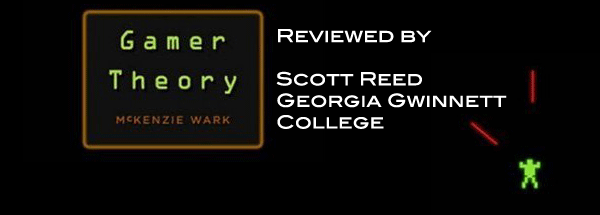
Published in 2007, Mckenzie Wark's Gamer Theory offers a challenging and far-reaching approach to the study of games. In this review, I'll try to offer not just an account of Wark's own thought, but to discuss the work's theoretical foundations, its far ranging implications for the way we conceive of our spaces of work and play, and the ways it offers both a hermeneutic for reading games and a challenge for actively producing new and rhetorically engaged work on gaming.
A note on citations:
Gamer Theory utilizes a rather idiosyncratic organizational system. Originally published online in 2007, each of Gamer Theory's chapters is divided into 25 distinct lexia and numbered sequentially. The printed version retains the numbering scheme of the original, so that a citation of (163) refers not to page 163, but to that particular lexia within the book's sixth chapter.







